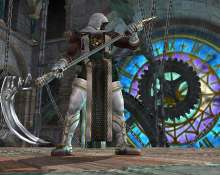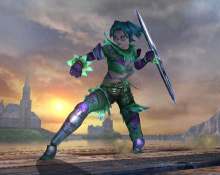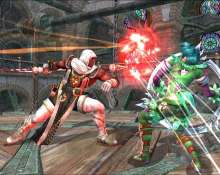By
Michael Palisano
Namco takes their legendary fighting
series a step forward with the release of Soul Calibur 3 on the PS2.
Featuring an extensive character creation system, the game allows players
to fight it out in a variety of game modes. These range from traditional
arena battles to a pair of RPG-like modes that offer an incredible amount
of depth and challenge. As you'd expect, the game's highly polished
visuals and balanced fighting are superb. Several new characters blend
right into the existing cast and enhance the addictive gameplay the series
has become famous for. Join us as we enter the battle and find out why
Soul Calibur 3's added depth makes this installment the best in the series
to date.
Since the PS1's Soul Blade was released
nearly a decade ago, Namco has continually refined the series until it has
become the standard which other weapons measure based fighters. With the
release of Soul Calibur 3, the company sets the bar even higher with a new
level of character customization and design that few titles can match. In
the basic features department, SC3 features three new characters added on
to the existing cast making for more than 20 playables in all. Each of
these brings a unique fighting style to the franchise, and blend in
perfectly with the existing characters. Players will also find a greater
selection of arenas in the game as well, bringing additional variety to
the battles. Each of these characters has a unique set of weapons, which
players can choose from before each battle, with additional weapons
unlockable later in the game. In addition to the standard characters,
players can create their own warriors. The ambitious character-design mode
allows you to create and use your own character. You can select the
character's race, class (Ninja, Monk, Dancer, etc), and customize their
appearance. Your options seem somewhat limited initially but, you can also
unlock additional character creation parts as you play the game. This is
an impressive feature that allows you to completely immerse yourself in
the SC universe, while adding your own unique personality to the gameplay.
 This customization system is flexible
but you'll want more than a nice looking model, so after you've created
your own character, you'll want to use them in battle. To this end, Soul
Calibur 3 includes several different modes of play for single and
multi-player action. There are several single player modes included.
Players can choose to battle it out in the arena with other characters,
challenge a series of story battles in the Tales of the Sword mode, or go
even deeper into the new Chronicles of the Sword mode, which is more like
a traditional RPG than a fighting game. In Chronicles, your objective is
to clear out a map of enemy strongholds, each of which can be taken over
in a series of battles. You can choose two characters for this mode and
move them around the map, battling foes in either voluntary or forced
battles. As you defeat these enemies, you'll win items that you can use to
enhance your character's attributes. Each map is divided into several
strongholds, you beat these levels when you take over an enemy's main
stronghold. When you complete one of the Chronicle levels, you move on to
the next. The maps here gradually become larger and more challenging,
making each quest even deeper. Chronicles of the Sword adds much to the
game, adding a layer of strategy to each battle, since you have to
conserve your energy in order to have a chance against the bosses lurking
at the end of your journey. This innovative real time strategy mode mixes
traditional SC fighting with RTS elements seamlessly making it one of the
deepest and most elaborate we've seen in a fighting game to date, and it
definitely adds to Soul Calibur 3's replay value immensely.
This customization system is flexible
but you'll want more than a nice looking model, so after you've created
your own character, you'll want to use them in battle. To this end, Soul
Calibur 3 includes several different modes of play for single and
multi-player action. There are several single player modes included.
Players can choose to battle it out in the arena with other characters,
challenge a series of story battles in the Tales of the Sword mode, or go
even deeper into the new Chronicles of the Sword mode, which is more like
a traditional RPG than a fighting game. In Chronicles, your objective is
to clear out a map of enemy strongholds, each of which can be taken over
in a series of battles. You can choose two characters for this mode and
move them around the map, battling foes in either voluntary or forced
battles. As you defeat these enemies, you'll win items that you can use to
enhance your character's attributes. Each map is divided into several
strongholds, you beat these levels when you take over an enemy's main
stronghold. When you complete one of the Chronicle levels, you move on to
the next. The maps here gradually become larger and more challenging,
making each quest even deeper. Chronicles of the Sword adds much to the
game, adding a layer of strategy to each battle, since you have to
conserve your energy in order to have a chance against the bosses lurking
at the end of your journey. This innovative real time strategy mode mixes
traditional SC fighting with RTS elements seamlessly making it one of the
deepest and most elaborate we've seen in a fighting game to date, and it
definitely adds to Soul Calibur 3's replay value immensely.
In addition, you can choose to play in
the World Competition mode, where you face a series of tournaments against
ranked players, each bracket offering a greater challenge than the one
before. After facing off against the standard AI competitors, these
opponents put up a much fiercer attack. This is when you'll appreciate the
balance and depth that have been put into the game. SC3 plays very much
like the previous games, though with added strategy and nuance. As usual,
a key strategy is to use the Soul Charge move to temporarily give your
weapon extra power, however, your vulnerable to attack when you are
charging. Another key strategy is mastering your character's movement, so
you can use 8 way running moves and side step moves to avoid attacks, or
to position your character to attack from behind. This system is
intuitively designed and allows you a great deal of freedom. After you've
mastered the basic of movement and attack, learning the correct timing of
low, mid and high range attacks is crucial. Players will also find the
guard and break moves effective and easy to learn. You can also attack
opponents from the air or other directions and can even break an
opponent's guard moves if you gain enough skill. In addition, the gameplay
offers a more balanced weapons system, where the direction and speed of
your attacks plays a key role in how much damage your opponent takes. Your
character also has a number of attributes that determine which type of
attacks will do the most damage. SC3's advanced techniques such as
counters, throws, and guard impacts are quite effective at downing
opponents. Using these along with damaging Ukemi attacks that throw your
opponents to the ground make for some very effective battles. If you have
excellent timing, you can inflict a lot of pain using the Just Impact
moves, which increase the amount of damage substantially. Soul Calibur 3's
fighting system gives each player a number of powerful weapons at the
start, and players can purchase additional weapons and armor at the store
to enhance their character's movement. With such a deep fighting system,
Soul Calibur 3 offers a number of different training paths in order to
polish your skills. You can learn the basic commands in the practice mode,
or polish your skills in the tournament modes, working your way through
the competition, learning tricks and moves along the way. The game's
balance a depth is excellent for the most part, though some of the bosses
use cheap shots that make for some frustrating moments.
 Soul Calibur 3's controls remain
intuitive and fluid which makes performing special attacks and combos
quite simple, most players should be able to pick up the basics quickly,
without taking too much of a learning curve. This accessibility has been
one of the series' hallmarks and the smooth flow of the action makes this
quite appealing. Character movement is also superb this time around with a
smooth system that allows you a great deal of versatility when you are
dancing on the arena with your opponent. Previous installments in the
series have suffered from excessive numbers of ring outs, but these
moments occur rarely and have to be earned or deserved. Most of the
returning characters have a familiar set of moves and attacks, though some
of their move sets have changed slightly to adjust the balance. The new
characters bring some new moves to the table, but they don't differ
substantially from existing characters, making them easy to learn and use.
Players familiar with the previous game should have no problem with the
control and interface, which stays true to the feel of the earlier Soul
Calibur titles. With such a tightly balanced, thoroughly deep set of moves
and commands, SC3 is probably the most polished to date from a control
standpoint, and stands up there with the best 3D fighters on the market.
Soul Calibur 3's controls remain
intuitive and fluid which makes performing special attacks and combos
quite simple, most players should be able to pick up the basics quickly,
without taking too much of a learning curve. This accessibility has been
one of the series' hallmarks and the smooth flow of the action makes this
quite appealing. Character movement is also superb this time around with a
smooth system that allows you a great deal of versatility when you are
dancing on the arena with your opponent. Previous installments in the
series have suffered from excessive numbers of ring outs, but these
moments occur rarely and have to be earned or deserved. Most of the
returning characters have a familiar set of moves and attacks, though some
of their move sets have changed slightly to adjust the balance. The new
characters bring some new moves to the table, but they don't differ
substantially from existing characters, making them easy to learn and use.
Players familiar with the previous game should have no problem with the
control and interface, which stays true to the feel of the earlier Soul
Calibur titles. With such a tightly balanced, thoroughly deep set of moves
and commands, SC3 is probably the most polished to date from a control
standpoint, and stands up there with the best 3D fighters on the market.
From a visual standpoint, Soul Calibur 3
exceeds the high quality of its predecessors with an impressive
presentation that makes for an incredibly cinematic experience. The
cut-scenes between rounds are much more elaborate this time around,
allowing for increased character development that brings you right into
the storyline. There are also some interesting action points in some of
the cinemas where you have to press a button or move in a certain
direction, further adding to the immersion. From a technical standpoint,
the game excels on the PS2 with an incredible amount of detail evident in
the character models themselves, which move with a natural realism and
fluidity few other 3D fighters on the PS2 can match. The arenas are set in
a breathtaking array of environments ranging from mountaintop vistas, to
hidden temples, rafts that float under a tunnel and more. Soul Calibur 3's
arenas are all the more impressive thanks to the extensive lighting and
weather effects, which place the battles in a believable world. Underneath
the clanging of swords and weapons, you'll hear the series' trademark
orchestral score, a grand symphony that adds to the drama and epic feel of
your character's quest. SC3's voice acting is surprisingly good, with
English language used to underline the characters' personality. While
previous titles in the series, such as the memorable Dreamcast launch
title, have set high standards, Soul Calibur 3 features the most polished
looking title in the series yet. Its smooth, highly polished production
values are quite impressive, which is no small achievement this late in
the system's lifespan.
 Namco has consistently improved this
long-running franchise over the years and the additions this time around
are quite impressive. Giving players the ability to create and customize
their own characters is an excellent start, with a custom avatar on screen
allowing you to further immerse yourself into the action. The standard
play modes remain as enjoyable and addictive as ever, but the game's new
Chronicle of the Sword mode mixes 3D battles with RTS elements brilliantly
to create one of the unique extra modes seen in a fighting game to date.
The gameplay remains just as addictive as ever and the fighters' moves and
controls remain deep and responsive. The play balance and depth of moves
is impressive as well, with a simple, intuitive layout that allows new
players to jump right in while veterans will find plenty of depth under
the surface. Soul Calibur 3 is another brilliant turn for the series. This
installment lives up to its heritage while pushing the boundaries of the
series in new directions, with an amazing amount of depth and flexibility,
creating an immense amount of replay value while giving players a much
longer, more satisfying journey to take.
Namco has consistently improved this
long-running franchise over the years and the additions this time around
are quite impressive. Giving players the ability to create and customize
their own characters is an excellent start, with a custom avatar on screen
allowing you to further immerse yourself into the action. The standard
play modes remain as enjoyable and addictive as ever, but the game's new
Chronicle of the Sword mode mixes 3D battles with RTS elements brilliantly
to create one of the unique extra modes seen in a fighting game to date.
The gameplay remains just as addictive as ever and the fighters' moves and
controls remain deep and responsive. The play balance and depth of moves
is impressive as well, with a simple, intuitive layout that allows new
players to jump right in while veterans will find plenty of depth under
the surface. Soul Calibur 3 is another brilliant turn for the series. This
installment lives up to its heritage while pushing the boundaries of the
series in new directions, with an amazing amount of depth and flexibility,
creating an immense amount of replay value while giving players a much
longer, more satisfying journey to take.

